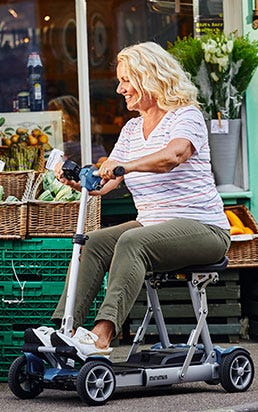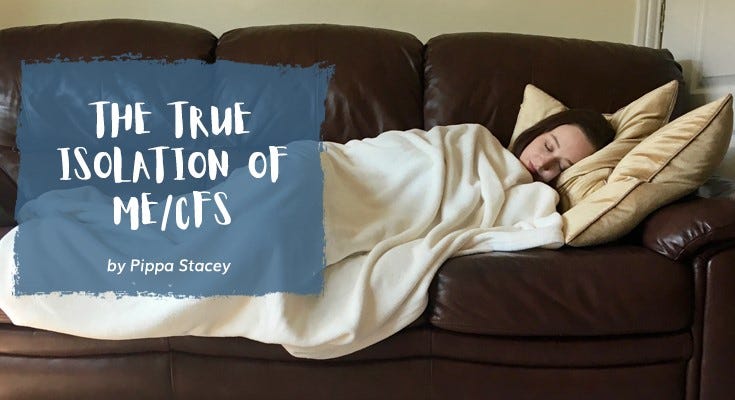With May being ME/CFS Awareness Month, the coming few weeks are typically full of moving advocacy from the chronic illness population. We, as patients, typically urge non-disabled people to try and put themselves in our shoes, refute the stigma that still sadly exists, and consider how they themselves would cope with the isolation this condition all too often brings. This year, however, we seem to have got more than we bargained for: for the first time ever, the general public are experiencing a small but significant glimpse into what it’s like to be confined to their homes.
In many ways, the global pandemic has served as a catalyst in helping people remain feeling a part of society when they’re unable to leave the house. The education and employment sectors have begun operating remotely, many entertainment venues are streaming content and finding new creative outlets to keep us all occupied, and generally speaking, we all seem to be looking out for each other more too. On the surface, this time may well seem like the golden opportunity for the non-disabled population to become more aware of the challenges chronically ill people face.
However, as somebody with ME/CFS who has been sitting back and calmly watching the country scramble to adapt, it occurred to me that there are still key differences in our perceptions of what it means to be isolated. Yes, non-disabled people are isolated in the sense that their ability to leave their homes has been restricted by the authorities.
For the first time, they’re having to compromise popping in and out of the house to work or to socialise at their own will, and having to find new ways of occupying themselves. Again, from a distance, I’ve observed people launching themselves into new hobbies or projects: taking up a new craft or musical instrument, launching social groups or activities over the internet, or committing to new fitness goals by walking, running or cycling increasing distances.
Living in Isolation is Tough
Many non-disabled people, even with all these new pastimes to explore, however, are still finding isolation and social distancing to be tough. And they have every right to admit they’re struggling: this is an entirely new world to them, and everybody’s feelings are valid.
However, all these things just go to show that non-disabled people’s experiences of isolation are simply incomparable to the trauma and neglect that people with ME/CFS have been facing for decades. For those with ME/CFS who have spent months and years of their life physically unable to leave the house, or even their bed, pursuing any kind of activity to pass the time is often a huge struggle in its own right. In many cases, it’s simply unthinkable.
Quite frankly, finding ways even to tolerate the extreme symptoms the condition plagues you with can consume every last scrap of energy you have. Additionally, with such a notoriously misunderstood condition, isolation doesn’t only present itself in the physical sense. As well as being physiologically unable to engage with the world around you, many patients have experienced hostility and ridicule from those around them, including the medical profession. For years, ME/CFS was dismissed as a minor complaint, a personal weakness rather than the debilitating neurological condition that research is only now truly beginning to delve into.
Breakdown of Relationships
Living with an invisible illness, at all levels of severity, is tough. When others cannot physically observe your symptoms and your struggle for themselves, there can be an inclination to doubt whether they even exist at all. Because of this, many people with ME/CFS and other conditions have also had to tolerate the breakdown of relationships, familial ties and social circles, all on top of managing their health and wellbeing.
It really can feel as if you’re bearing the weight of the world on your shoulders. I truly believe that if you want to see a true glimpse into what isolation really is, you need to look at patients with Severe M.E. Confined to their homes and beds, painfully unable to tolerate noise and light, let alone the presence of other people, struggling to speak or communicate at all. These patients have often been cast aside or forgotten by specialists and social care, left alone simply to endure the cards they have been dealt.
Coronavirus Isolation is Temporary
I’ll be the first one to say that there’s no need to make it into a competition. Arguing over who has it worse helps nobody, particularly in times like these. However, perhaps you can now understand why seeing non-disabled people, coming in from their daily walk, calling their families and engaging with all manner of new activities, yet still thinking that this is isolation in the most extreme sense, is a little more difficult to take on the chin.
The fact that people still have all of these things, and are still so connected to the outside world in these ways, just goes to show that there’s are huge discrepancies in our perceptions of what it really means to be isolated. So, although this time may give non-disabled people a small inkling into what it’s like to be isolated due to long-term illness, and there are certainly lessons to be learned from this, it’s so important to emphasise that what they’re experiencing right now isn’t necessarily a true reflection of life with chronic illness.
I hope, I really do hope, that this time encourages people to mindfully reflect on what isolation really means, and that the more flexible nature of society we’re currently experiencing is here to stay. In the meantime, however, this month is a time to shine a light on the continued struggles of people with ME/CFS, and how far we still have to go. I hope that those with the condition are as comfortable and safe in their homes as possible, and keeping their spirits up. The battles can seem relentless, but every year, we’re one step closer to shining a light on the true nature of the condition. Hang in there.
For more information on ME/CFS, visit ME Association or Action For ME. You can read about my personal chronic illness story, including the onset and diagnosis of my own ME/CFS, in this post. If you have any concerns about your own condition, always seek advice from a GP or medical professional involved in your care.


 Price Match Promise
Price Match Promise
 Next day delivery, 7 days a week
Next day delivery, 7 days a week
 Nationwide Showrooms
Nationwide Showrooms
 Rated Excellent
Rated Excellent







